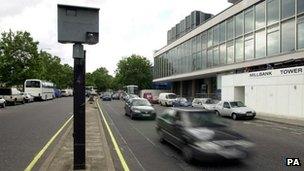Every death on every road in Great Britain 1999 - 2010
- Published
In 2010, the police recorded 1,850 deaths, 22,660 people seriously injured and 184,138 who received light injuries.
But this is still a fraction of the true number of people hurt in road collisions.

Funding targets for speed cameras have been dropped
Though police say every death is recorded, there is widespread under-reporting of injuries. In fact, government officials estimate that around 730,000 are either killed or hurt every year.
The cost in terms of personal tragedy for many families is, of course, incalculable. The economic cost, however, is easier to gauge.
According to the Department for Transport, the annual economic burden of road casualties is between £15bn and £32bn. By way of comparison, Britain's budget deficit is around £17bn.
Last year saw the steepest fall in fatalities in the post-war period, down by 17%. It followed a fall of 12% between 2008 and 2009.
It is likely that much of this was down to the recession. When the economy slows, the number of road casualties usually does too.
Yet, for the first half of 2011, the number of people dying on the roads rose for the first time in four years. In January to March, the deaths were up 6% while in April to June, they jumped by 7%.
"The rise in deaths occurred at a time when the economy continued to flatline," explains Rob Gifford, of the Parliamentary Advisory Council on Transport Safety (Pacts). If this trend were to continue, 2011 would be the first year to see a rise in the annual death toll since 2003.
Mr Gifford says he is worried that the government has become complacent and is sending out the wrong message about road safety.
Targets row
In May this year, the then transport secretary, Philip Hammond, set out the government's new priorities to tackle the annual toll on the roads.
Out went national targets for reducing casualties and funding for speed cameras. In came an emphasis on education for the "law-abiding majority" and enforcement for the "wilfully reckless". In addition, under the "Big Society" banner, local authorities and communities were also asked to do more about road safety too.
Maria Eagle, Labour's shadow transport secretary, has called the package of measures "reckless, completely unambitious and politically driven".
"These are real people's lives destroyed. Parents losing children, children losing parents. This is avoidable and we have to focus on reduction," she adds.
Other leading institutions, ranging from the AA to the RAC Foundation, as well as a host of former road safety ministers, have criticised the government for a "lack of ambition".
The government's central target for reducing deaths by the end of the decade is just 4.7%. The European Commission has set a target of halving road deaths in the EU by 2020.
Mrs Eagle says that dropping targets is a mistake, sending a "message that [road safety] is no longer a priority".
Introduced by Conservative roads safety minister Peter Bottomley in the 1980s, targets are credited with galvanising effort across the board to drive down deaths and injuries on the roads.
Inherited by the incoming Labour government in 1997, they became a central plank of its road safety policy. Pacts' Rob Gifford says there is clear evidence that targets work.
"All those countries that have had targets have done better than those without," he says.
In a statement, the Department for Transport said Road Safety minister Mike Penning denied there was a lack of ambition.
"We are taking action to tackle the most dangerous drivers, for example, by making it easier for the police to enforce against drink and drug driving, proposing to increase penalties for offences including driving while using a mobile phone, and introducing a new fixed penalty for careless driving," he said.
He also defended the decision to drop targets. "This government expects to be judged by its actions and we have been clear that we do not believe that 'Whitehall knows best' national targets are needed to persuade people of the importance of road safety. And we certainly do not need to aim at an arbitrary number to prove our commitment to saving lives."